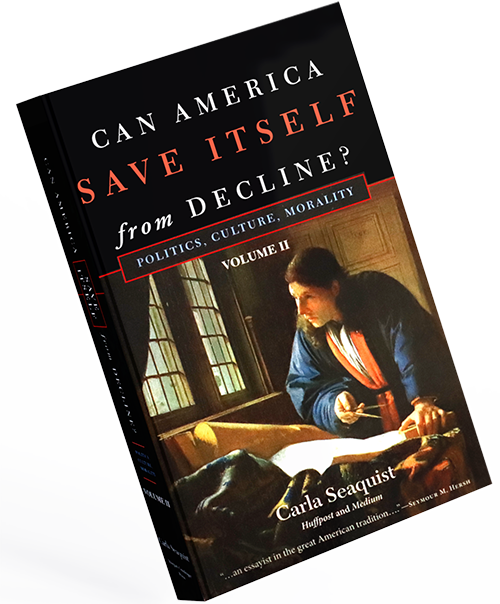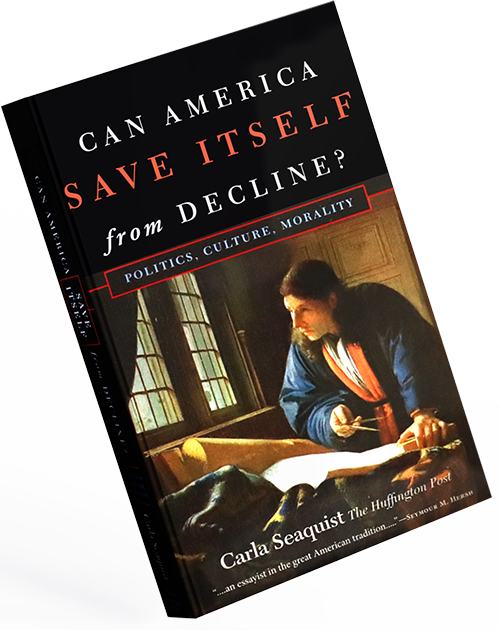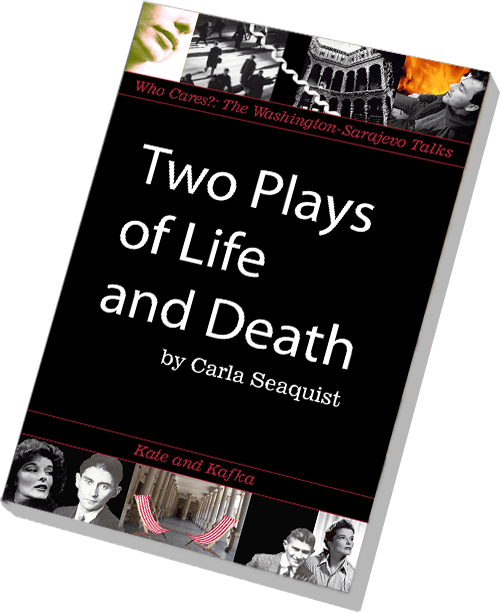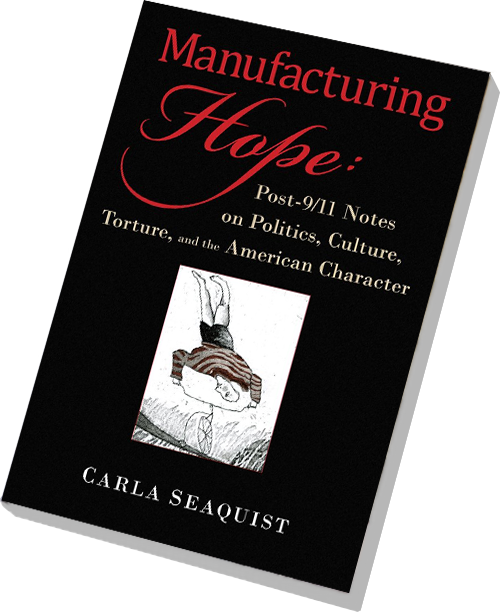BOOKS
by Carla Seaquist

CAN AMERICA SAVE ITSELF FROM DECLINE?:
Politics, Culture, Morality
Volume II
2015-2021; 612 pages
“….an essayist in the great American tradition.”
— Seymour Hersh, investigative reporter
“Prescient and eloquent. Carla Seaquist is in top form.”
— Brian Baird, former member of Congress
“Smart and well-informed takes on the great
issues of a tumultuous era.”
— Kirkus Reviews
In Vol. II, Carla Seaquist in her HuffPost and Medium commentary traces the tumultuous period 2015-2020—from the “anger election of 2016” to the earthquake tenure of Donald Trump, examining how Trump accelerated America’s decline with his assault on American democracy itself. Seeking elevation, Seaquist counsels on creeping authoritarianism, racism, sexism, despair (“Don’t”). Culturally, she examines Western Civilization’s playbook of Tragedy and points the way upward (“Shut Up, Hamlet, and Drive”). In a series “Notes from a Plague-Time,” she chronicles the COVID-19 pandemic, including rereading Albert Camus’ novel The Plague, this time with real understanding. In an extended end-essay, the author addresses the question posed in the title.
Sample titles of 125 essays include: “Free Speech vs. Responsible Speech”; “Whatever Happened to the Famous American Ability to Say ‘Nuts’ to Charlatans, Crazies, and Fear-Mongers?”; “A ‘Breaking Bad’ Culture Got Its President”; “For Effective Resistance, Keep It Nonviolent, Respectful, Clean”; “A Historic Reckoning on Sexual Harassment: In Low Times, a Good Sign”; “Counter-Forces to Chaos: We’re Becoming Constitutionalists, Ethicists, Candidates for Office, and Other Good Things”; “Surrendering America’s Most Precious Mantle, ‘Leader of the Free World’”; “Can a Narcissist Comprehend Treason?”; “The Republicans and Donald Trump: A Faustian Bargain (Annotated)”; “Is America Having a Breakdown or a Reckoning? 7 Arguments for Reckoning”; “Impeaching Trump Would Be Right in Principle, But Disastrous Politically”; “My Fellow White Americans: Are We About Blood Identity or America’s Ideals?”; “’The Moral Obligation to Be Intelligent’: Now More Than Ever”; “For Republicans, 2020 Election is Political. For Democrats, It’s Existential.”
Chronicling the COVID-19 pandemic, 11 posts in the “Notes from a Plague-Time” series include: the need for truth and experts; reaching out to friends while self-isolating; redefining “essential” worker; seeking beauty, truth, lightness; seeing Can-Do Nation unmasked as Can’t-Do; rereading Camus’ The Plague; running for elective office in a pandemic (personal insights). Various “For Our Times” series include essays on books, film, plays, TV. Personal essays include “Writing for Our Post-9/11 Times” and “How to Keep a Good Marriage During Bad (Trumpian) Times.”
“Carla Seaquist is an essayist in the great American tradition of plain talk, common sense, strong ethics, and an understanding that one cannot understand current politics, foreign policy or domestic travail without a deep knowledge of history. Her work is informed, readable and provocative, in the best sense—making the reader think in new ways.”
-Seymour M. Hersh, investigative reporter
“Prescient and eloquent. Carla Seaquist is in top form.” –Brian Baird, former member of Congress

CAN AMERICA SAVE ITSELF FROM DECLINE?:
Politics, Culture, Morality
Volume I
2009-2015; 344 pages
“….an essayist in the great American tradition.”
— Seymour Hersh, investigative reporter
Can America save itself from decline? This is the question many Americans are pondering. Great nations throughout History have followed the pattern of rise and rise, then decline and fall. Is this America’s fate, or can we reverse our decline and rise again? In the belief that if any great nation can reverse its decline, America can—we believe in reinvention, we are not fatalists yet, but it will take stronger leadership and reform than seen to date—Carla Seaquist in her wide-ranging commentary for The Huffington Post addresses this historic challenge from various angles—political, economic and financial, cultural and moral—all in the context of the American character. Vol. I traces the 2008 financial crash through increasing political polarization and cultural weakening. In an extended end-essay, she addresses the question posed in the book’s title.
Sample titles of 75 essays include: “Recovery Without a Reckoning”; “Fat Cat Pledge: ‘I Will Pay Higher Taxes’”; “Risk Management According to Moby Dick“; “A War’s Premise Must Justify the Troops’ Suffering”; “My Republican Mother Says Yes to Gun Control”; “Exceptional Nations Don’t Bluster”; “Get Thee to Geneva, Mr. Obama: Your Drone Strikes Make Targets of Us All”; “Humor: There’s Funny—and There’s Symptom of Decline”; “Free Speech vs. Responsible Speech”; and “Democrats Are ‘Disgusted’ with Politics? Boo Hoo.”
“Carla Seaquist is an essayist in the great American tradition of plain talk, common sense, strong ethics, and an understanding that one cannot understand current politics, foreign policy or domestic travail without a deep knowledge of history. Her work is informed, readable and provocative, in the best sense—making the reader think in new ways.”
-Seymour M. Hersh, investigative reporter

TWO PLAYS OF LIFE AND DEATH:
“Who Cares?: The Washington-Sarajevo Talks”
and “Kate and Kafka”
(2012)
Universal and timeless, these companion plays chart the journey of a man and a woman struggling together on the Road of Life and Death.
“Who Cares?: The Washington-Sarajevo Talks”: Based on the playwright’s phone calls to a man under siege in Sarajevo, running one of the city’s last independent radio stations, this play dramatizes the power of human contact and of normalcy amid chaos. Inevitably leaves the audience, and often the actors, in tears. Cast of two. Productions (3): Victory Gardens Theater (Chicago); Studio Theatre (Washington, D.C.); Festival of Emerging American Theatre, Phoenix Theatre (Indianapolis).
“Kate and Kafka”: In this dream play, Katharine Hepburn the Life Force contends with Franz Kafka the Death Force in an end-of-the-world setting, the Sanatorium Ultime, amid biological warfare. Contrary to his death-loving image, and thanks to Kate’s pushing, a life-affirming Kafka is ultimately revealed—reflecting the real Franz Kafka found in his late diaries and letters. Cast of four. Reading: Last Frontier Theatre Festival, founded by Edward Albee.
Both plays were selected by the Oregon Shakespeare Festival as its entry in the Ashland New Plays Festival.

MANUFACTURING HOPE: POST-9/11 NOTES ON POLITICS, CULTURE, TORTURE, AND THE AMERICAN CHARACTER
(2009)
A collection of the author’s commentary for
The Christian Science Monitor:
“Big-think in a personal voice”
When the terrorist attacks of Sept. 11, 2001 occurred, author Carla Seaquist was living in one of the targeted cities, Washington, D.C. Seeing the Pentagon on fire, its black smoke filling the sky, she knew instantly she did not want to react as the playwright she was at the time, to dramatize how horrific that historic day was. Instead, she wanted to help. America had been dealt a blow, a lethal one, and she wanted to make sense of it, help the country recover, combat with reason whatever was coming next.
Commentary, Seaquist realized, was her vehicle—and this book, Manufacturing Hope, is the result: a collection of the op-eds, essays, and dialogues she wrote in response, with many of the pieces published originally in The Christian Science Monitor. Written from the barricades and seeking to point the way, Seaquist’s insights illuminate the intersection where politics, culture, ethics and morality, and the American character meet—reflected in this book from first (“Reinventing ‘Normalcy’”) to last (“Going after Godot,” about the return of hope with the election of President Barack Obama).
And when news of Abu Ghraib broke in May 2004, Seaquist reacted that day and continued to protest in print against America’s shameful descent into torture (ex., “Bush’s Torture Policy Hurts Our Soldiers” and “Abu Ghraib and the Mirror”). Leavening the book’s dark realities are Seaquist’s wit (“Goodbye, Tony Soprano. Welcome back, Atticus Finch”), innovative style (two essays in dialogue, “Behemoth in a Bathrobe” and “Back to Casablanca”), and her philosophical understanding that, to reverse the nation’s decline, America’s can-do spirit must be reignited and muscled up: that is, we must manufacture hope.